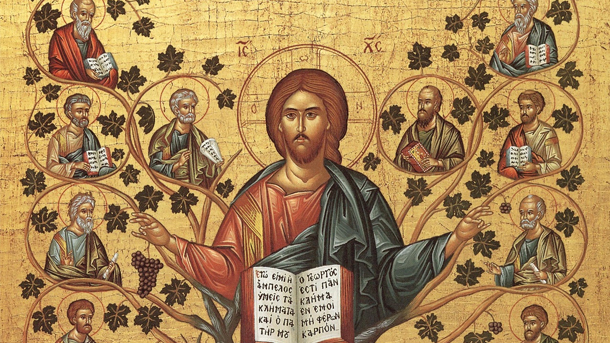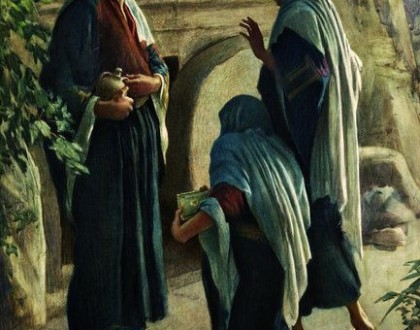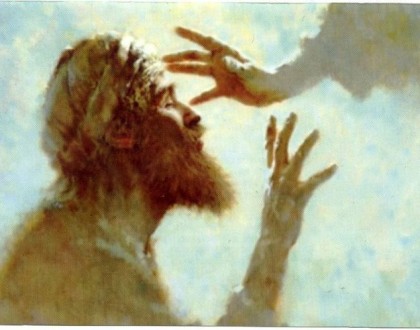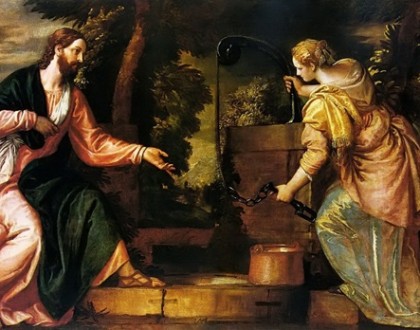Fifth Sunday of Easter, Year B – May 3rd, 2015

Fifth Sunday of Easter, Year B – May 3rd, 2015
In John’s Gospel (15:1-8) for the 5th Sunday of Easter, we have the image of the vine and its branches to express the relationship between Christ and his disciples. We should not be surprised that at one level it seems utterly simple, but that at other levels it fills us with a sense of mystery, awe, and beauty, always leaving us wanting more.
The branches of a vine have an intimate relationship with the vine, depending on it at all times and forming one living organism with it. The vine, which can be a bit foreign in northern climates, is natural for anyone in the Middle East, where many families possess a vine, a fig tree, or olive trees in their gardens.
Jesus tells his followers that he is the true vine, the real vine, and that they are the branches, whose task is to bear fruit by sharing his life: “I am the true vine, and my Father is the vinedresser. Abide in me, and I in you. If you abide in me, and my words in you, ask whatever you want. Apart from me, you can do nothing.”
Today’s passage is one of the classic descriptions of authentic Christian spirituality. If Jesus is the vine, we are summoned to ‘abide,’ to ‘live,’ to make our home ‘in him.’ The Gospel text of the vine challenges us: How do we maintain intimacy with the living God as we strive to be obedient to our vocation of bearing fruit for the world? What does it mean, to ‘abide’ or ‘dwell’ in the vine, to be intimately attached to Jesus?
Abiding in Jesus includes being part of the life of the Church, committed to the daily and weekly fellowship of his people, in mutual support, prayer, common worship, sacramental life, study and not least, work for the Gospel in the world. In every Eucharistic celebration we are drawn into that intimate fellowship both with Jesus himself and with each other at his table.
Authentic Christian spirituality is the personal knowledge of Jesus Christ given to us, as the vine gives its sap to the branches, so that we can be extensions of his work, his love, his fruit-bearing, his glorifying of the Father. That is the heart of the Eucharistic mystery.
To abide with Jesus we need to be pruned
And yet as soon as Jesus introduced the theme of the vine and the branches in the Gospel passage, he speaks of his Father, the vinedresser, doing two things that require a knife. Every branch that doesn’t bear fruit, the Father removes, cuts away; and every branch that does bear fruit the Father prunes, so that it may bear more fruit.
The spirituality to which this Gospel passage invites us is not one of unbridled personal development, fulfilling all the potential we might discover within ourselves. As we follow Jesus and come to know him personally, we find him calling us to submit to the pruning-knife, to cut out some things from our lives that are good in themselves and that would even have had the potential to develop into fruit-bearing branches, in order that other things may flourish. Pruning is always a painful process. It is a form of loss or death. The vinedresser is never more intimately involved than when wielding the pruning-knife!
The call to abide in the vine is a call to a personal and intimate knowledge of Jesus himself, not an idea, but a living person. True disciples of Jesus are dependent on the inner presence and activity of Christ for the renewal and regeneration of their own life into one of faith and love. True disciples can only be effective in the regeneration of the lives of others when they are “plugged into Jesus,” grafted onto his life, allowing his very presence to pulsate through their minds and hearts.
The images of vine and vineyard are brought together beautifully in that well-known passage from “Lumen Gentium,” No. 6, the Second Vatican Council’s Dogmatic Constitution on the Church:
“The Church is a piece of land to be cultivated, the tillage of God. On that land the ancient olive tree grows whose holy roots were the Prophets and in which the reconciliation of Jews and Gentiles has been brought about and will be brought about. That land, like a choice vineyard, has been planted by the heavenly Husbandman. The true vine is Christ who gives life and the power to bear abundant fruit to the branches, that is, to us, who through the Church remain in Christ without whom we can do nothing.”
This week, let us pray that our belonging to Christ be profound and real, going beyond all of the turbulence that exists on life’s surface. May Christ’s very life flow through us, building up the Body of Christ that is the Church.
Recent Sermons

Easter Sunday – The Resurrection
April 14, 2017

4th Sunday of Lent Year A – The Man Born Blind
March 27, 2017

3rd Sunday of Lent Year A – The Samaritan Woman at the Well
March 20, 2017

